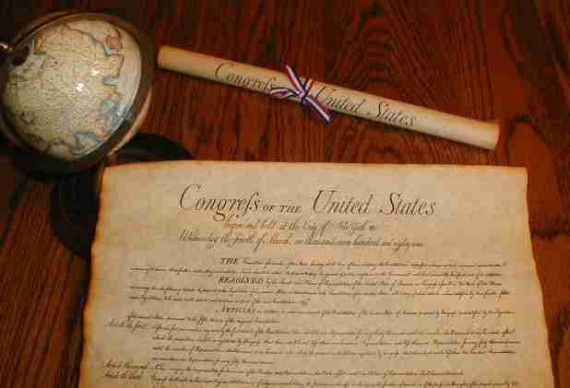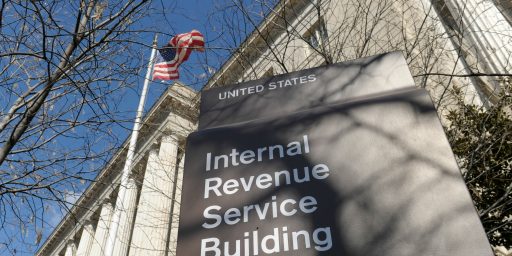Who Does The Bill Of Rights Protect? All Of Us
It's a mistake to think of the Bill of Rights as only protecting people who are "innocent" or "guilty." It exists to protect all of us.
Responding in part to one of my posts regarding Lois Lerner’s decision to invoke her rights under the Fifth Amendment in last week’s hearing before the House Government Oversight Committee, Jazz Shaw raises this point:
The fifth amendment – and the Bill of Rights in general – serve an important function and the Founders were wise to provide these protections. They wanted to make sure that the individual who was innocent could not be railroaded by the massive power of the government. They also serve to reaffirm the fact that the government needs to make its case beyond a reasonable doubt before a jury of your peers if you are accused of something. You need not say a word in court, and may choose to remain mute and force them to prove that you are guilty. But what if you are guilty? Or what if you are not personally guilty but have knowledge which would help lead to the truth and resolution of a possible crime? Are you under no obligation to help?
In short, have we arrived at the point where the Bill of Rights is less about protecting the innocent than it is about making sure the guilty have the best chance of going free, providing they can afford a slick enough attorney? This entire situation with Ms. Lerner makes no sense to me at this point, and it really seems like the fifth amendment is being turned on its head.
First of all, it’s important to note that Lois Lerner isn’t, at this moment, guilty of anything. She hasn’t been charged with a crime, and she certainly hasn’t been convicted of one. Indeed, right now we cannot even say with certainty that there will be sufficient evidence developed by the FBI’s criminal investigation to charge her, or anyone else, with a crime in connection with what happened at the Internal Revenue Service. For that reason, I think it’s dangerous, and factually incorrect, to categorize the debate over the Fifth Amendment and Lerner’s use of it in terms of “guilty” vs. “innocent” people. People can make judgments about whether or not they think Lois Lerner did anything wrong, they can even call her a criminal if they want, but the truth of the matter is that she’s as innocent as any one of us is at this point. So, even if you accept the argument that the Fifth Amendment exists primarily to protect the innocent, then the argument that it exists to protect Lois Lerner as well as you and me flows naturally from that. To argue otherwise is to assume that anytime anyone invokes their rights under the Fifth Amendment it is evidence that they must be guilty, and if the Amendment only protects the innocent, it obviously wasn’t intended to protect them.
More importantly, though, I think it’s a mistake to say that the protections of the 5th Amendment, or to broaden the argument any of the protections granted to actual and potential criminal defendants under the 4th, 6th, and 7th Amendments as well, were primarily designed to protect the innocent. On a superficial level, that simply isn’t supported by the text of the Amendments themselves, which apply to everyone in all situations. Indeed, the 5th Amendment’s right against self-incrimination doesn’t require that there actually be a pending criminal case or investigation, or that the testimony in question take place in a court proceeding connected with criminal charges. As long as their is a possibility that what someone says in a public forum, be it a criminal investigation or a deposition during the course of a civil trial, could potentially used to bring charges against them and prosecute them for a crime then the person being questioned has the right to invoke their rights under the Amendment. It’s not a question of being “guilty” or “innocent,” it’s that the Amendment exists to protect individuals from the state compelling them to testify in any situation, including a Congressional Committee hearing.
Finally, I’d note that it’s just as important that “guilty” people have the protections of the Fifth Amendment, along with the others that are supposed to restrain the power of the state during the course of a criminal investigation and trial as it is that someone who is “innocent” have those protections. In our criminal justice system, the prosecution and the police walk into court with tremendous advantages over the average criminal defendant. They have more money,they have access to all kinds of expert witnesses, when the police are questioning someone they can lie with impunity in an effort to trick them into making confessions, and through it all they have the imprimatur of the state behind them. The 4th through 8th Amendments exist to protect the individual charged with a crime, who is we should remember innocent until proven guilty beyond a reasonable doubt, from the overwhelming power of the state, and that’s true whether one is “guilty” or “innocent” on some metaphysical level.
So, the answer to the question “who does the Bill of Rights protect?” is, all of us. And that’s exactly how they were designed to work.






Amen. For once we agree 100 percent.
Somebody has been watching to much ‘Law and Order’ or other police/law drama. Which is probably where this “innocent”/”guilty” divide comes from. There the hero police are always being thwarted in their heroic efforts by the guilty hiding behind the Constitution getting that absolute guilt-proving evidence or confession thrown out.
But this idea of the Bill of Rights being used to protect the “guilty” because the “innocent”, i.e., not charged, have no real remedy for when their rights are violated. If you are “guilty”, i.e, accused by the virtuous government officials in many people’s minds, your fancy lawyer can use his tricks to have evidence thrown out. But, if you are “innocent” then you are let to go on your way, feeling lucky you dodge the bullet, but complain and suddenly you are back in the crosshairs.
Everyday, “innocent” people’s rights are violated. In NYC alone, they have a program where thousands are stopped and forcibly searched each year on speculative “probable cause” then sent along their way with a sense of good fortune for it not being their turn for a ride downtown. But these thousands have no recourse other than political protest to seek recompense for the violation and know they won’t be so lucky next time if an asterisk appears next to their name in the stop and frisk database.
So in reality, we afford the Bill of Rights to the “guilty” because without them, “guilty” we’d all be at the whim of the State. Assuming, a lack of political connections to make a violation politically risky to the police.
Agreed 100% Doug and JKB.
Again, Robert Bolt provided one of the best defenses of our Bill of Rights (and other such protective laws) in his play “A Man For All Seasons.”
Thank God for the Fifth Amendment:
http://www.youtube.com/watch?v=6wXkI4t7nuc
Note particularly the much of the talk is spent giving examples of why an innocent person should want to remain silent anyways.
Indeed.
Good post.
And to reinforce something that has already been said: one is not “guilty” until one is convicted. As such, the notion that the Fifth Amendment protects the “guilty” at this stage of a process is an utter non sequitur.
@Steven L. Taylor:
This gets to another critical concept–with regards to the fifth amendment–Guilt and Innocence are both simply the findings of a court.
It’s entirely possible for someone to be found “guilty” of a crime that they never committed.
@Matt Bernius: Indeed.
Come on Doug, you should know by now that the only part of the Constitution that the GOP or conservatives care about is the Second Amendment (and the Fourteenth, but only insofar as it incorporates the Second and only the Second according to “constitutional” conservatives).
Conservatives/GOP know the text, history, and purpose of the Fifth Amendment and claim to love them Founding Fathers, but they regularly ignore 99.5% of what is in the Constitution along with anything the Founding Fathers wrote on the rights of people.
How about we stop giving them the benefit of the doubt?
@JKB: Who are you and what have you done with the real JKB?
Basically, liberals believe that the Fifth Amendment protects the innocent, and the Second Amendment protects the guilty, while conservatives believe that the Second Amendment protects the innocent and the Fifth Amendment protects the guilty.
Good post Doug, and good comments, all around.
@al-Ameda:
Call… can you explain that one? Cause I’m having a real hard time with the logic there.
What a sharp, succinct post. Raised glass to you, Mr Mataconis.
I’d quibble a bit about this:
They have more money,they have access to all kinds of expert witnesses,
if only because (particularly in complex financial fraud cases), the federal government doesn’t deploy all of its resources toward one case, thus, a well-heeled firm can often successfully employ a delaying tactic rather successfully against a D.A. with considerably less firepower at her disposal.
That said, it’s worth noting that these protections were employed soon after a time when “the right people” were threatened with imprisonment – or worse – at the hands of a British colonial governor.
@Matt Bernius:
Of course the reverse is also true – that someone can be found innocent of a crime they certainly committed.
Jefferson is quoted as calling the delegates to the Constitutional Convention “an assembly of demigods,”.
I suspect he would agree that they accomplished their feat without supernatural intervention.
@Ernieyeball:
I am agnostic, so when I say thinks like “Thank God” or “God Damnit”, I don’t mean it literally.
Since I did not cite your post as the source of the quote I figured, in error, that the reader would know I was quoting the Law Professor at the beginning of the clip.
In fact that’s where I thought you got it.
One again I have violated my own Prime Directive…Never ASSume Anything.
“Once again…”
No edit function for Safari…must change browser…
@Woody:
I’ve worked on these, and in complex financial fraud cases, the defendants and their lawyers aren’t usually facing a local D.A., but rather the federal Justice Department assisted by the SEC, which have more than enough resources to match any individual law firm, no matter how well-heeled. The balance of power generally continues to rest with the prosecution.
@Andy:
No, it’s not, because there is no legal finding of “innocent.” Defendants are only found “not guilty”, which does not necessarily mean that they are innocent, but rather that the government failed to prove its case beyond a reasonable doubt.
@Andy:
Or as @Rafer Janders points out, rather than “innocent” it simply means they have been found “not guilty.”
So I muddied the waters in this case by bringing up the “I” word.
Aside: I’ve been told that the Brits use “Proven” and “Unproven” in their courts. Can anyone verify or correct that understanding?
@Matt Bernius:
I believe that’s only in the courts of Scotland, not of Britain as a whole, and that only “Unproven” is used. (Scotland has a slightly different legal system than that of England and Wales).
@Matt Bernius:
In the scottish legal system a jury has 3 verdicts available to it.,
Guilty,Not Guilty and Not Proven.
Legally the last 2 have exactly the same effect but the Not guilty verdict is the jury indicating that they didn’t think the accused committed the crime, whereas Not Proven generally means the jury thinks he might have done it but the Crown did not prove its case beyond reasonable doubt.
.
@Timothy Watson: @Timothy Watson:
And the 10th, don’t forget the sacred tenth amendment – although that’s more libertarian I suppose.
I’ve always wondered about this, ‘who does the bill of rights protect?’ question. It seems to me that it protects all individuals, period, by virtue of instructing the government as to what it can and cannot do.
And by everyone, I mean, all human beings. It’s directed at limiting the government, right? Not at protecting a particular group of people. But I would very much appreciate feedback on this line of thought.